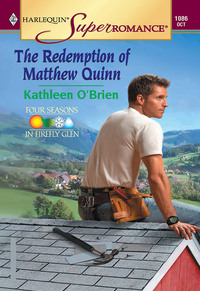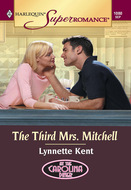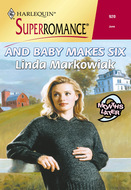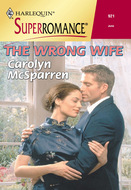This book cannot be downloaded as a file but can be read in our app or online on the website.
Read the book: «The Redemption Of Matthew Quinn»
Natalie Granville’s
TOP TEN THINGS TO DO ON YOUR NON-WEDDING DAY
10. Avoid pitying phone calls from your concerned friends and relatives. (Especially when you’re the “jilter,” not the “jiltee.”)
9. Avoid visits from your concerned friends and relatives. (As above.)
8. Find a useful alternative for that never-to-be-worn gown. (Dressing up garden statuary is de rigueur this season.)
7. Don’t wear white—unless it’s decidedly not wedding gear. (That bikini will do the trick just fine.)
6. Drink whatever you want to calm those non-wedding jitters. (Leave the champagne cocktails for the misguided fools who do want to get married.)
5. Never let anyone tell you you’re bitter. (Remember—you broke it off because you were getting married for the wrong reasons.)
4. Return all the presents given to you by your wealthy former fiancé. (You don’t want anyone to accuse you of gaining anything but experience from this sad affair.)
3. Break all the rules you want. (After all, everyone in town is already talking about you.)
2. Celebrate your narrow escape. (You really did do the right thing.)
And the number one thing to do on your non-wedding day: Hire the gorgeous guy with the mysterious past who shows up at your door looking for work….
Dear Reader,
What a potent concept the past is! I’ve known people who cling to it, people who slide it under a microscope, people who run screaming from it and even a few who rewrite it. I’ve never met anyone who is indifferent to it.
I’m no exception. I loved being seven, eighteen, twenty-five. I revere my oldest friends, because when I say, “remember when,” they do. My house is full of nicked chairs my grandmother bought. My conversations are decorated with my father’s pearls of wisdom, and my conscience is buckled in tight with my mother’s admonitions.
I’m free to love my past, because I’m also free to tell it to get lost. Sometimes I give away the chair that doesn’t fit. Now and then I string my own pearls. Occasionally I even blow my mother a mental kiss, salute her for teaching me to think for myself, and do the thing she said I mustn’t.
But what if you couldn’t? What if your past owned you—instead of the other way around? That’s what happened to Matthew Quinn. He’s just been released from prison, but in his heart he’s still locked away. He can’t forget his past, not even long enough to fall in love.
It’s going to take a special woman to redeem him. But Natalie Granville is a prisoner of her past, too. She’s shackled to Summer House, a moldering old relic she doesn’t want, can’t afford and yet feels a duty to preserve.
The Redemption of Matthew Quinn is the story of how they finally manage to come to terms with the past—and to fall in love with the future. I hope you enjoy making the journey with them.
Warmly,
Kathleen O’Brien
The Redemption of Matthew Quinn
Kathleen O’Brien

Books by Kathleen O’Brien
HARLEQUIN SUPERROMANCE
927—THE REAL FATHER
967—A SELF-MADE MAN
1015—WINTER BABY*
1047—BABES IN ARMS*
CONTENTS
CHAPTER ONE
CHAPTER TWO
CHAPTER THREE
CHAPTER FOUR
CHAPTER FIVE
CHAPTER SIX
CHAPTER SEVEN
CHAPTER EIGHT
CHAPTER NINE
CHAPTER TEN
CHAPTER ELEVEN
CHAPTER TWELVE
CHAPTER THIRTEEN
CHAPTER FOURTEEN
CHAPTER FIFTEEN
CHAPTER SIXTEEN
CHAPTER SEVENTEEN
CHAPTER ONE
AT HIGH NOON when she should have been saying “I do,” Natalie Granville was lounging on the cracked porch of her maggoty mansion, wearing nothing but a bikini, a smile and a light coating of perspiration.
Through the open double doors to the parlor, she listened to the answering machine. At least ten people had already called to check on her. Their messages ranged from the carefully indirect— “Hi, Nat, just wondering if you felt like talking”—to the blunt growls of her elderly cousin Granville Frome— “Dammit, girl, where are you? If you’re holed up somewhere crying, I’m going to break that bastard’s nose.”
But Natalie ignored them all. She was a Granville, and by heaven she didn’t need anybody’s pity.
She hoisted herself onto the wide marble banister and lay back carefully, so that the sun could bake her entire body. She slathered sunscreen across the bridge of her nose, where those annoying freckles liked to pop up, balanced her bottle of Jack Daniel’s on her stomach, and went on enjoying the heavenly day.
The would-have-been wedding day. Above her, the hot blue sky wore white lace clouds. Around her, the air sparkled like diamonds. The birds were singing schmaltzy romantic ditties.
Actually, she admitted to the bottle, trying to be honest— Granvilles were unflinchingly honest—it would have been a lovely day to get married.
Then she grinned, though her lips felt a little bit numb. Aw, who was she kidding? It was an even lovelier day to not get married.
Oops. Her grandfather wouldn’t like that split infinitive. Granvilles always used perfect grammar. She raised the bottle over her head and, without turning her head, apologized to the glowering portrait that hung on the parlor wall.
“Sorry, Gramps. I guess I’m breaking all the rules today.”
She wouldn’t have called him Gramps, either, if it hadn’t been for the Jack Daniel’s. And the fact that he’d been dead for five years.
“Um, hello. Miss? Excuse me.” A man’s voice floated up to her from the driveway, which sloped away beside the terraced garden. “Sorry, but I have a delivery for Natalie Granville?”
She maneuvered herself upright carefully, straddling the banister as if it were a marble horse. “I’m Natalie Granville,” she said politely. Darn, this position felt kind of awkward—the man was looking at her very strangely.
And she couldn’t quite decide what to do with the Jack Daniel’s. She didn’t want the bottle to fall off and break. She hugged it to her side, but that didn’t seem very hospitable, so she held it out. “Want some?”
The man—more like a boy, really—flushed. “No thanks,” he said quickly. He held out a very large, flat box. “I just need your signature for this.”
Natalie stared at the package, which looked familiar. Not the sort of thing she received for the nursery business she ran from the greenhouse, though. Too flat. Too feminine, with its shiny white corners.
Hmm. She frowned. Jack Daniel’s might taste wonderful, but it didn’t exactly help you to think clearly. Had she been expecting a delivery?
“I— Can you sign? It’s for you. It’s from Apple Blossom Bridal.”
Aw, shucks. Natalie’s shoulders sagged. The wedding dress.
“I don’t want it,” she said, closing her eyes and waving the half-empty bottle vaguely. “Could you maybe just throw it away as you leave?”
“Um…not really.” The kid sounded downright nervous now. “I’ll leave it here, okay?” He set the box on the banister, moving in slow motion, as if he had discovered it contained nitroglycerine. “Just right here.”
Natalie sighed and had another swallow of Jack Daniel’s, which, taken straight like this, was muscular enough to etch its initials in her esophagus. She shivered, loving it.
“Okay.” She wiped her mouth and smiled at him. “If you have to.”
Tucking the bottle under her elbow, she reached over, signed his clipboard, and then began unwrapping the box.
“It’s my wedding dress,” she said conversationally. “Or I guess it’s technically my non-wedding dress. Today is my non-wedding day, you see. I told them I didn’t need the dress anymore, but they wouldn’t give me my money back. Don’t you think that’s mean? I was only getting married in the first place because I needed money so badly, and now—”
But the deliveryman was already gone. Natalie looked at the empty yard around her, the acres and acres of once-beautiful gardens, and sighed. He hadn’t even waited for a tip. Didn’t he know Granvilles always tipped beautifully? That was why they were constantly broke. Well, that and the gambling. And the women.
And the house. Always the house. This crazy, crumbling, hungry monster of a house.
She unfolded her gown and shook the creases out of the soft white cotton lace. It was an okay dress—not great. She’d bought the cheapest one in town, although they’d all been absurdly expensive. That was the problem with living in a community of millionaires. Price tags came in only three sizes: Big, Bigger and Downright Astronomical.
She held the pearled bodice up against her chest, trying to imagine herself wearing it. She couldn’t.
She climbed down off the banister and tried again, letting the layered skirt fall all the way to her ankles. She dipped and swayed, trying to capture the dreamy, princessy feeling she used to get as a kid, when she’d rummage through the attic trunks, pretending to be a damsel in distress. She had shuffled to the attic window, antique lace dragging behind her, and surveyed her flowering kingdom.
In her ten-year-old imagination, she had always witnessed the galloping arrival of her handsome prince, her gallant knight, her brave cavalier. Or, her personal favorite, her Pair of Moors—a phrase she’d heard the grown-ups use, though she had no idea what it really meant. A few years later, when she’d learned what a “paramour” actually was, it had been a crushing disappointment.
Still pressing the gown to her chest, she moved back to the balcony and gazed down over the ruined Summer House grounds, all the way down to where the mountain ledge overlooked the tiny kingdom of Firefly Glen.
But no prince was fighting his thorny, perilous way up the mountain path. Nothing. Not so much as a speck on the horizon. Even the deliveryman’s truck had long since disappeared.
She held out the wedding dress and scowled at it. It might be a five-hundred-dollar gown, but the darn thing didn’t possess five pennies’ worth of magic.
“Nat, are you there?” The answering machine was at it again. It was Stu. He’d called three times already. “Want me to come over and take you out to lunch? I don’t want you lying around feeling sorry for yourself.”
She stuck her tongue out at the machine, then knocked back another swig of Jack Daniel’s. How dare he? She was enjoying her afternoon alone, that was all. Granvilles didn’t feel sorry for themselves.
So this would have been her wedding day. So what? She’d called it off two weeks ago. She’d told Bart Beswick to take his rough hands, his wet kisses and his big bank account and get lost. She was a Granville, and Granvilles didn’t sell themselves to the highest bidder.
Bart had been surprised, but not heartbroken. He’d wanted her name and her house, and he’d been pretty sure she would count herself lucky to get his money in return.
But he must have forgotten what exactly that grand old name he lusted after really meant. Granvilles chose freedom. Exhausted, overworked, penniless freedom. Granvilles might secretly hope that someday, somehow, the long-overdue prince would still find his way up the mountain, but they certainly didn’t stand around twiddling their thumbs, waiting for it to happen.
“Feeling sorry for myself? Ha!” She slurred the s in “sorry” just a little, but no one could hear her. In a minute or two, she was going to go inside, drink some strong coffee and get back to peeling the mildewed wallpaper from the Blue Bedroom. She was going to see if anyone had answered her “Handyman Wanted” ad.
She might even practice spackling, which was actually much harder than it looked.
Yep, she was going to get busy. In a minute or two. Or three.
But she sighed, dreading it. Her dress draped over her arm, she leaned her elbows on the pitted marble banister and stared down the long, empty slope of terraced gardens.
And then, because she was a Granville, she forgot about going inside. Because she was a Granville, she kept staring, dreaming, seeing flowers where no flowers had bloomed in ten neglected years.
And because she was a Granville, she closed her eyes. And as she drifted off, she could almost hear, over the birdsong and the breeze, the distant rumble of galloping hooves.
MATTHEW QUINN peeled the perforated address strip off the “Handyman Wanted” sign and studied it carefully before putting it in his pocket.
Summer House, it said in a frilly, but shaky, calligraphy— 717 Blue Pine Trail. And a telephone number.
Summer House. Looking at the calligraphy, Matthew pictured the owner as an eighty-year-old, silver-haired widow who would make weak tea and cookies for the handyman, but would never invite him into the musty, cluttered twilight of her Victorian sanctum.
Especially not if she knew he’d just been released from prison.
She had tacked the notice to a community bulletin board outside Firefly Glen’s red brick Town Hall. The other notices on the board described a pure Norman Rockwell weekend: the Firefly High Astronomy Club stargazing seminar, the fly fishermen’s annual casting contest, the Firefly Girls’ Saturday car-and-boat wash, the Congregational Church chicken barbecue and white elephant sale.
And, prominently displayed, a picture of a grinning Highland terrier that read simply, “Rob Roy ran away again. If you see him, call me. Theo.”
Apparently everyone knew who Theo was. Everyone but Matthew.
He felt strangely paralyzed, standing at the high end of Main Street, gazing down at the row of quaint, expensive shops. Red-white-and-blue flags flew. Yellow flowers bloomed. Windows sparkled in the summer sun.
It suddenly looked like a stage set, as if it had been painted on cardboard and could be rolled away at will, revealing the familiar dirty, weed-ridden prison yard behind.
He wondered if he had been kidding himself. Could he really ever fit into a place like this again? He had picked this destination three years ago, during his first month in prison. He’d spent long, sleepless hours looking at a map of New York State, imagining where he would go when he was free again.
He hadn’t even noticed Firefly Glen the first few times. It was that small. But once he’d seen it, it had become a kind of obsession. A symbol. You couldn’t imagine anything ugly happening in a place called Firefly Glen. You just knew there would be clean air, warm smiles, wholesome food, simple pleasures—all those decent things they made you empty out of your pockets when they processed you into prison.
But now that he was here—now that it was not just a symbol, but a reality—he felt as out of place as a lump of coal in a cabbage patch, as his grandfather used to say. Maybe prison had changed him too much. Maybe he didn’t believe in Norman Rockwell anymore.
“Hi, there. You look lost. Can I help?”
The voice was friendly, but, when Matthew looked up, he saw that the pleasant brown eyes of the stranger in front of him were careful and wary.
“I’m Harry Dunbar,” the man said. And then he added, pointing his thumb toward his shiny gold star with a smile, “I’m the sheriff of Firefly Glen.”
Suddenly Harry lurched, as another man came up behind, bumping into him rudely.
“Sorry, Harry,” the second man said, grinning. He seemed to be holding a third man up by the collar. “Boxer here is having a little trouble with a straight line this morning.”
“Of course he is,” the sheriff grumbled. “It’s Saturday, isn’t it?”
The second man noticed Matthew, and looked over, smiling. “Hi,” he said, putting out his free hand, briefly letting go of the bleary-eyed fellow he’d been guiding. “I’m Parker Tremaine.”
Was everyone in this town so compulsively friendly? Matthew, who had lived in New York City all his life, hadn’t really expected this. He wondered if this Parker guy was a sheriff’s deputy. Maybe he and the sheriff were both just trying to size Matthew up, trying to decide if he was a desirable or a threat to their idyllic little Rockwell paradise.
But as Matthew shook Parker’s hand, he caught more details, and he realized Parker was no public servant. He was a vastly different type. He wore a very expensive business suit. The suit was a statement. Elegant, understated, educated.
Yes, he knew Parker’s type. He had even been Parker’s type, once upon a time. Just three years ago, he’d worn suits like that, walked like that, smiled out on his world with comfortable confidence like that. Three short years. But it might as well have been a million.
“Are you trying to ticket this poor guy for leaving his car in a no-parking space?” The man smiled over at Matthew. “Harry takes his job very seriously. But don’t worry. I can get you off.”
Matthew flinched and his gaze flicked to the curb instinctively. He hadn’t noticed any signs. He didn’t break the smallest of laws anymore. He didn’t speed, didn’t change lanes without signaling. He didn’t even jaywalk.
But the sheriff was smiling crookedly. “Parker’s being funny,” he said to Matthew. “The restrictive paint’s been worn off that space for years. Can’t get maintenance to repaint, can’t get the town council to cough up money for a sign.” He turned back to the man in the suit. “Why don’t you take Boxer on home, Parker? He could use a shower. He’s getting a little ripe in this hot sun.”
Parker frowned and turned. “Oh, hell. Where is Boxer?” He scanned the area quickly, and then his gaze settled on the ground near the door to the sheriff’s department. “Great. He’s passed out again.”
He sighed, then turned back and smiled at Matthew. “Welcome to Firefly Glen. Never a dull moment. I’m the local lawyer, and that guy on the ground over there is just one of our many beloved eccentric millionaires.”
Matthew glanced at the heap of rumpled clothes propped up against the wall of the building. “Boxer” had begun to hum softly, leading an imaginary band with one finger. The guy sure didn’t look like a millionaire. He had a black eye, a bad haircut, and he did, indeed, stink.
“Well, get him out of here, or I’m going to lock him up again.” Sheriff Harry swiveled back to Matthew and his guarded look returned. “So, was I right? Are you lost? Anything I can help you with?”
Matthew considered asking him for directions to Blue Pine Trail, but at the last minute he decided against it. The two men seemed friendly enough, but in prison you didn’t tell anyone anything, just on principle. Apparently the habit was going to cling to him, the same way the odor of cheap stew and strong prison bleach seemed to cling to the inside of his nose.
“No, thanks,” he said, forcing himself to look Harry Dunbar straight in the eye. If he was going to stay here for the summer, he might as well make friends with the locals.
And then it hit him—his decision had been made. He was going to stay, assuming he could get a job. This wasn’t some imaginary Oz with streets of gold, some enchanted Eden from which people like him had been forever banished. It was just a rather ordinary small town. It had grumpy sheriffs, Friday night drunks, inefficient elected officials, slick lawyers and lost dogs, just like hundreds of small towns across New York State.
And its houses needed repair. Matthew knew how to do that. He’d spent every summer during college with a hammer in his hands, and he could spend this one the same way.
“I was just having a look around.” He steadied his gaze. “I’m here for the summer.”
The sheriff frowned, as if the explanation didn’t quite satisfy him, but suddenly Parker Tremaine let out a low curse.
“Harry, look at this,” Parker said, staring at the bulletin board. “I warned Natalie not to post her address on these ads, and she’s done it anyway.”
Matthew wondered what the lawyer would say if he knew one of those address slips was even now tucked away in Matthew’s pocket.
“She did?” The sheriff stalked over and read the notice. Then, with a grumble, he ripped it off the board and crumpled it in his fist. “Hell, now I’ll have to go all over town tearing the darn things down. I tell you, Parker, Granvilles have always been too naive to live, and Natalie Granville is the worst of the lot.”
A sudden commotion erupted from the direction of Boxer’s corner. “Natalie Granville is a hell of a sweet woman, and I’ll kick the ass of anyone who says she’s not,” the old man said, struggling to his feet. He glared at the sheriff. “In fact, I think I’ll kick your ass anyhow, Dunbar, just for saying her name in that tone of voice.”
“Parker—” the sheriff began tightly.
“I know, I know. I’ll get him out of here. Just give me a hand.”
And while the two civilized young professionals were wrestling the crusty old drunk to his feet, Matthew seized his chance.
No one saw him climb into his car and drive away. No one asked where he was going, and he wouldn’t have told them if they had.
Because he was going to find Natalie Granville. He was going to tell her the truth about himself, and he was going to ask her for a job. Maybe she was just naive enough to believe in things like fair play and second chances—concepts he was pretty sure the suspicious sheriff would consider foolish.
Matthew pressed harder on the gas, overcome by a sudden urgency. Maybe this was why he had chosen Firefly Glen. Silver haired and sweet, the despair of cynical sheriffs yet beloved by pugilistic drunks, Natalie Granville just might be the answer to prayers Matthew hadn’t even realized he was praying.








